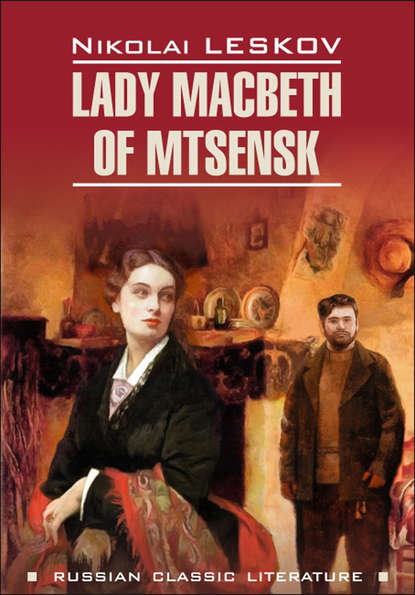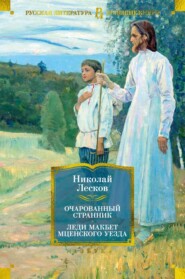По всем вопросам обращайтесь на: info@litportal.ru
(©) 2003-2024.
✖
Lady Macbeth of Mtsensk and Other Stories / Леди Макбет Мценского уезда и другие повести. Книга для чтения на английском языке
Настройки чтения
Размер шрифта
Высота строк
Поля
“Light, here,” she said to Sergei, going to the door. “Lower, hold it lower,” she said, carefully studying all the floorboards over which Sergei had dragged Zinovy Borisych to the cellar.
In only two places on the painted floor were there two tiny spots the size of a cherry. Katerina Lvovna rubbed them with the sponge and they disappeared.
“That’ll teach you not to sneak up to your wife like a thief and spy on her,” said Katerina Lvovna, straightening up and glancing in the direction of the larder.
“Finished off,” said Sergei, and he jumped at the sound of his own voice.
When they returned to the bedroom, a thin red strip of dawn was cutting across the east and, lightly gilding the blossom-covered apple trees, peeked through the green slats of the garden fence into Katerina Lvovna’s room.
The old clerk, a short coat thrown over his shoulders, crossing himself and yawning, came trudging through the yard from the shed to the kitchen.
Katerina Lvovna carefully drew the shutter closed and looked Sergei over attentively, as if she wished to see into his soul.
“So now you’re a merchant,” she said, laying her white hands on Sergei’s shoulders.
Sergei made no reply.
His lips were trembling, he was shaking feverishly. Katerina Lvovna’s lips were merely cold.
After two days, Sergei had big callouses on his hands from the pick and heavy spade; but Zinovy Borisych was laid away so nicely in his cellar that, without the help of his widow or her lover, no one would have been able to find him before the general resurrection.
Chapter Nine
Sergei went around with his neck wrapped in a crimson kerchief and complained of a swelling in his throat. Meanwhile, before the traces left on Sergei by Zinovy Borisych’s teeth had healed, Katerina Lvovna’s husband was missed. Sergei himself began speaking of him even more often than others. He would sit by the gate in the evening with other young fellows and say: “Really, lads, how is it the master hasn’t turned up yet?”
The young fellows were also surprised.
And then news came from the mill that the master had hired horses and gone home long ago. The driver who had taken him said that Zinovy Borisych had seemed to be in distress and had dismissed him somehow strangely: about two miles from town, near the monastery, he got off the cart, took his bag, and walked away. Hearing this story, everybody was still more surprised.
Zinovy Borisych had vanished, and that was that.
A search was made, but nothing was discovered: the merchant had vanished into thin air. From the testimony of the arrested driver, it was learned only that the merchant had gotten out by the monastery on the river and walked away. The matter was never clarified, but meanwhile Katerina Lvovna, in her position as a widow, lived freely with Sergei. There were random surmises that Zinovy Borisych was here or there, but Zinovy Borisych still did not return, and Katerina Lvovna knew better than anyone that it was quite impossible for him to return.
A month went by like that, and another, and a third, and Katerina Lvovna felt herself heavy.
“The capital will be ours, Seryozhechka; I have an heir,” she said to Sergei, and she went to complain to the town council that, thus and so, she felt she was pregnant, and the business was stagnating: let her take charge of it all.
A commercial venture should not go to waste. Katerina Lvovna was her husband’s lawful wife: there were no apparent debts, which meant they ought to let her. And so they did.
Katerina Lvovna lived like a queen; and at her side Sergei was now called Sergei Filippych; and then smack, out of nowhere, came a new calamity. Somebody wrote to the town headman from Livny saying that Boris Timofeich had not traded all on his own capital, that more money than his own had been invested in the business, the money of his young nephew Fyodor Zakharovich Lyamin, and that the matter had to be looked into and not left in the hands of Katerina Lvovna alone. The news came, the headman talked about it with Katerina Lvovna, and then a week later, bang, an old lady arrives from Livny with a little boy.
“I am the late Boris Timofeich’s cousin,” she says, “and this is my nephew, Fyodor Lyamin.”
Katerina Lvovna received them.
Sergei, watching this arrival from the courtyard, and the reception Katerina Lvovna gave the new arrivals, turned white as a sheet.
“What’s wrong?” asked his mistress, noticing his deathly pallor, when he came in after the arrivals and stopped in the front room, studying them.
“Nothing,” he replied, turning from the front room to the hallway. “I’m just thinking, how lovely is Livny,” he finished with a sigh, closing the door to the hallway behind him.
“Well, what are we to do now?” Sergei Filippych asked Katerina Lvovna, sitting with her at night over the samovar. “Now our whole business together is turned to dust.”
“Why to dust, Seryozha?”
“Because now it will all be divided. Why sit here managing a futile business?”
“Will it be too little for you, Seryozha?”
“It’s not about me; I only doubt we’ll be as happy as before.”
“Why is that? Why won’t we be happy, Seryozha?”
“Because, loving you as I do, Katerina Lvovna, I’d like to see you as a real lady, and not as you’ve lived so far,” replied Sergei Filippych. “But now, on the contrary, it turns out that with reduced capital we’ll have to descend to an even lower level than before.”
“What do I care about that, Seryozha?”
“It may be, Katerina Lvovna, that you’re not at all interested, but for me, since I respect you, and again looking at it with other people’s eyes, base and envious as they are, it will be terribly painful. You may think as you like, of course, but I, having my own considerations, will never manage to be happy in these circumstances.”
And Sergei played over and over on that same note for Katerina Lvovna, that because of Fedya Lyamin he had become the unhappiest of men, deprived of the opportunity to exalt and distinguish her before the entire merchant estate. Sergei wound up each time by saying that, if it were not for this Fedya, the child would be born to Katerina Lvovna less than nine months after her husband disappeared, she would get all the capital, and then there would be no end or measure to their happiness.
Chapter Ten
And then Sergei suddenly stopped talking about the heir altogether. As soon as the talk of him ceased on Sergei’s lips, Fedya Lyamin came to lodge in Katerina Lvovna’s mind and heart. She became pensive and even less affectionate towards Sergei. Whether she slept, or tended the business, or prayed to God, in her mind there was one and the same thing: “How can it be? Why should I be deprived of capital because of him? I’ve suffered so much, I’ve taken so much sin upon my soul,” thought Katerina Lvovna, “and he comes and takes it from me without any trouble… Well and good if he was a man, but he’s a child, a little boy…”
There was an early frost outside. Of Zinovy Borisych, naturally, no word came from anywhere. Katerina Lvovna was getting bigger and went about deep in thought; in town there was much beating of drums to do with her, figuring out how and why the young Izmailov woman, who had always been barren, thin as a pin, had suddenly started swelling out in front. And the young co-heir, Fedya Lyamin, walked about the yard in a light squirrel-skin coat, breaking the ice on the potholes.
“Hey, Fyodor Ignatych! Hey, you merchant’s son!” the cook Aksinya would shout at him, running across the yard. “Is it fitting for you, a merchant’s son, to go poking in puddles?”
But the co-heir, who troubled Katerina Lvovna and her beloved object, kicked up his feet serenely like a little goat and slept still more serenely opposite his doting old aunt, never thinking or imagining that he had crossed anyone’s path or diminished anyone’s happiness.
Fedya finally ran himself into the chicken pox, with a cold and chest pains attached, and the boy took to his bed. First they treated him with herbs and balms, and then they sent for the doctor.
The doctor came calling, prescribed medications, the old aunt herself gave them to the boy by the clock, and then sometimes asked Katerina Lvovna.
“Take the trouble, Katerinushka,” she would say, “you’re big with child yourself, you’re awaiting God’s judgment – take the trouble.”
Katerina Lvovna never refused her. When the old woman went to the evening vigil to pray for “the child Fyodor who is lying in sickbed” or to the early liturgy so as to include him in the communion, Katerina Lvovna sat with the sick boy and gave him water and his medications at the proper time.
So the old woman went to the all-night vigil on the eve of the feast of the Entrance and asked Katerinushka to look after Fedyushka. By then the boy was already getting better.
Katerina Lvovna went into Fedya’s room, and he was sitting on his bed in his squirrel-skin coat, reading the lives of the saints.
“What are you reading, Fedya?” Katerina Lvovna asked, sitting down in the armchair.
“I’m reading the Lives, auntie.”
“Interesting?”
In only two places on the painted floor were there two tiny spots the size of a cherry. Katerina Lvovna rubbed them with the sponge and they disappeared.
“That’ll teach you not to sneak up to your wife like a thief and spy on her,” said Katerina Lvovna, straightening up and glancing in the direction of the larder.
“Finished off,” said Sergei, and he jumped at the sound of his own voice.
When they returned to the bedroom, a thin red strip of dawn was cutting across the east and, lightly gilding the blossom-covered apple trees, peeked through the green slats of the garden fence into Katerina Lvovna’s room.
The old clerk, a short coat thrown over his shoulders, crossing himself and yawning, came trudging through the yard from the shed to the kitchen.
Katerina Lvovna carefully drew the shutter closed and looked Sergei over attentively, as if she wished to see into his soul.
“So now you’re a merchant,” she said, laying her white hands on Sergei’s shoulders.
Sergei made no reply.
His lips were trembling, he was shaking feverishly. Katerina Lvovna’s lips were merely cold.
After two days, Sergei had big callouses on his hands from the pick and heavy spade; but Zinovy Borisych was laid away so nicely in his cellar that, without the help of his widow or her lover, no one would have been able to find him before the general resurrection.
Chapter Nine
Sergei went around with his neck wrapped in a crimson kerchief and complained of a swelling in his throat. Meanwhile, before the traces left on Sergei by Zinovy Borisych’s teeth had healed, Katerina Lvovna’s husband was missed. Sergei himself began speaking of him even more often than others. He would sit by the gate in the evening with other young fellows and say: “Really, lads, how is it the master hasn’t turned up yet?”
The young fellows were also surprised.
And then news came from the mill that the master had hired horses and gone home long ago. The driver who had taken him said that Zinovy Borisych had seemed to be in distress and had dismissed him somehow strangely: about two miles from town, near the monastery, he got off the cart, took his bag, and walked away. Hearing this story, everybody was still more surprised.
Zinovy Borisych had vanished, and that was that.
A search was made, but nothing was discovered: the merchant had vanished into thin air. From the testimony of the arrested driver, it was learned only that the merchant had gotten out by the monastery on the river and walked away. The matter was never clarified, but meanwhile Katerina Lvovna, in her position as a widow, lived freely with Sergei. There were random surmises that Zinovy Borisych was here or there, but Zinovy Borisych still did not return, and Katerina Lvovna knew better than anyone that it was quite impossible for him to return.
A month went by like that, and another, and a third, and Katerina Lvovna felt herself heavy.
“The capital will be ours, Seryozhechka; I have an heir,” she said to Sergei, and she went to complain to the town council that, thus and so, she felt she was pregnant, and the business was stagnating: let her take charge of it all.
A commercial venture should not go to waste. Katerina Lvovna was her husband’s lawful wife: there were no apparent debts, which meant they ought to let her. And so they did.
Katerina Lvovna lived like a queen; and at her side Sergei was now called Sergei Filippych; and then smack, out of nowhere, came a new calamity. Somebody wrote to the town headman from Livny saying that Boris Timofeich had not traded all on his own capital, that more money than his own had been invested in the business, the money of his young nephew Fyodor Zakharovich Lyamin, and that the matter had to be looked into and not left in the hands of Katerina Lvovna alone. The news came, the headman talked about it with Katerina Lvovna, and then a week later, bang, an old lady arrives from Livny with a little boy.
“I am the late Boris Timofeich’s cousin,” she says, “and this is my nephew, Fyodor Lyamin.”
Katerina Lvovna received them.
Sergei, watching this arrival from the courtyard, and the reception Katerina Lvovna gave the new arrivals, turned white as a sheet.
“What’s wrong?” asked his mistress, noticing his deathly pallor, when he came in after the arrivals and stopped in the front room, studying them.
“Nothing,” he replied, turning from the front room to the hallway. “I’m just thinking, how lovely is Livny,” he finished with a sigh, closing the door to the hallway behind him.
“Well, what are we to do now?” Sergei Filippych asked Katerina Lvovna, sitting with her at night over the samovar. “Now our whole business together is turned to dust.”
“Why to dust, Seryozha?”
“Because now it will all be divided. Why sit here managing a futile business?”
“Will it be too little for you, Seryozha?”
“It’s not about me; I only doubt we’ll be as happy as before.”
“Why is that? Why won’t we be happy, Seryozha?”
“Because, loving you as I do, Katerina Lvovna, I’d like to see you as a real lady, and not as you’ve lived so far,” replied Sergei Filippych. “But now, on the contrary, it turns out that with reduced capital we’ll have to descend to an even lower level than before.”
“What do I care about that, Seryozha?”
“It may be, Katerina Lvovna, that you’re not at all interested, but for me, since I respect you, and again looking at it with other people’s eyes, base and envious as they are, it will be terribly painful. You may think as you like, of course, but I, having my own considerations, will never manage to be happy in these circumstances.”
And Sergei played over and over on that same note for Katerina Lvovna, that because of Fedya Lyamin he had become the unhappiest of men, deprived of the opportunity to exalt and distinguish her before the entire merchant estate. Sergei wound up each time by saying that, if it were not for this Fedya, the child would be born to Katerina Lvovna less than nine months after her husband disappeared, she would get all the capital, and then there would be no end or measure to their happiness.
Chapter Ten
And then Sergei suddenly stopped talking about the heir altogether. As soon as the talk of him ceased on Sergei’s lips, Fedya Lyamin came to lodge in Katerina Lvovna’s mind and heart. She became pensive and even less affectionate towards Sergei. Whether she slept, or tended the business, or prayed to God, in her mind there was one and the same thing: “How can it be? Why should I be deprived of capital because of him? I’ve suffered so much, I’ve taken so much sin upon my soul,” thought Katerina Lvovna, “and he comes and takes it from me without any trouble… Well and good if he was a man, but he’s a child, a little boy…”
There was an early frost outside. Of Zinovy Borisych, naturally, no word came from anywhere. Katerina Lvovna was getting bigger and went about deep in thought; in town there was much beating of drums to do with her, figuring out how and why the young Izmailov woman, who had always been barren, thin as a pin, had suddenly started swelling out in front. And the young co-heir, Fedya Lyamin, walked about the yard in a light squirrel-skin coat, breaking the ice on the potholes.
“Hey, Fyodor Ignatych! Hey, you merchant’s son!” the cook Aksinya would shout at him, running across the yard. “Is it fitting for you, a merchant’s son, to go poking in puddles?”
But the co-heir, who troubled Katerina Lvovna and her beloved object, kicked up his feet serenely like a little goat and slept still more serenely opposite his doting old aunt, never thinking or imagining that he had crossed anyone’s path or diminished anyone’s happiness.
Fedya finally ran himself into the chicken pox, with a cold and chest pains attached, and the boy took to his bed. First they treated him with herbs and balms, and then they sent for the doctor.
The doctor came calling, prescribed medications, the old aunt herself gave them to the boy by the clock, and then sometimes asked Katerina Lvovna.
“Take the trouble, Katerinushka,” she would say, “you’re big with child yourself, you’re awaiting God’s judgment – take the trouble.”
Katerina Lvovna never refused her. When the old woman went to the evening vigil to pray for “the child Fyodor who is lying in sickbed” or to the early liturgy so as to include him in the communion, Katerina Lvovna sat with the sick boy and gave him water and his medications at the proper time.
So the old woman went to the all-night vigil on the eve of the feast of the Entrance and asked Katerinushka to look after Fedyushka. By then the boy was already getting better.
Katerina Lvovna went into Fedya’s room, and he was sitting on his bed in his squirrel-skin coat, reading the lives of the saints.
“What are you reading, Fedya?” Katerina Lvovna asked, sitting down in the armchair.
“I’m reading the Lives, auntie.”
“Interesting?”

















